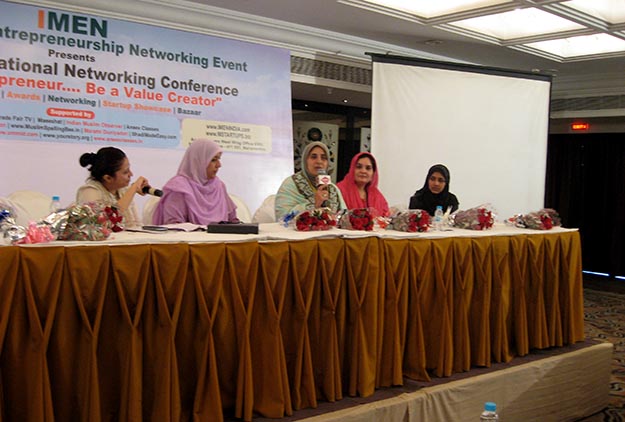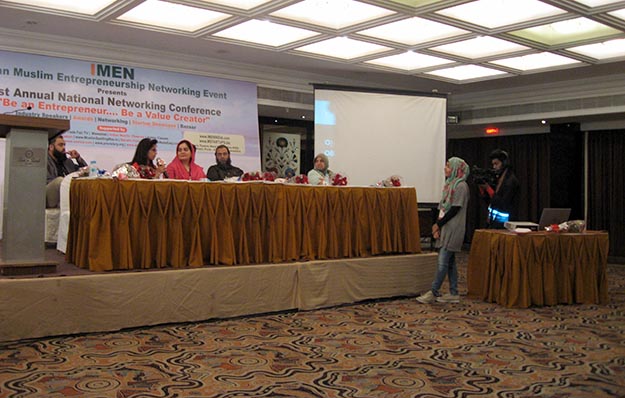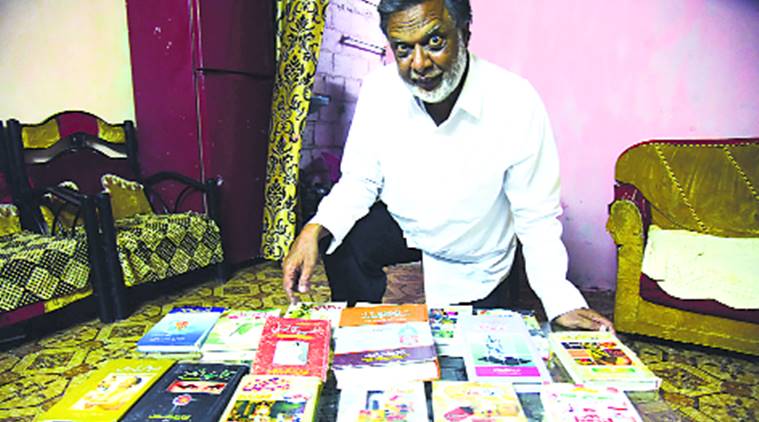Malegaon , MAHARASHTRA :
Rasheed Artist is one among these people in Malegaon, who despite all odds went on to achieve such a position, which is difficult for many even under most favourable conditions
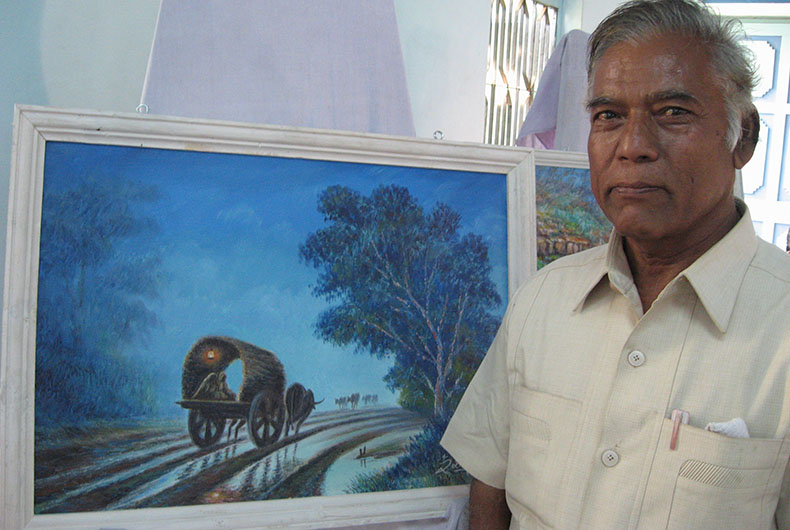
The powerloom factories in Malegaon might have been the only available option for the Malegaonians, the deprived people of the Muslim dominated textile town in North Maharashtra. Yet the amount earned after working in these factories was sufficient till a few decades ago to make one’s end meet easily. This perhaps is the reason why the town has surprising number of poets, laureates, scholars and artists who would work in these factories like petty labourers during the day and then indulge themselves in creative activities till late in the evening.
Rasheed Artist is one among these people in Malegaon, who despite all odds went on to achieve such a position, which is difficult for many even under most favourable conditions. Hanging against the walls of the main halls inside the plush bungalows owned by the dignitaries in India as well as in various other countries in the world, Rasheed Artist’s paintings are point of attraction for visitors since many years. Fabulous achievement indeed! However the journey that led to these walls was not easy, and for Rasheed Artist, it needed a matchless and unprecedented effort since childhood.
Malegaon in the sixties though had quite a good number of schools, managements could hardly find a good drawing teacher during those difficult days. Under these circumstances having a professional artist to teach the art of painting to students using watercolor was beyond one’s imaginations. However Rasheed Artist was resolute. He was just 15 but when he failed in fulfilling his strong desire for commercial art in the corridors of the education campus, he decided to quit schooling.
“It was my craze for paintings that forced me to drop out of the school in the early age”, he recalled.
Holding brush in one hand and color box in the other, he began roaming here and there to satisfy his lust for Art. It was then that Wad Saheb, a Director at Camel, the stationary giant famous for manufacturing pencils, watercolor and other stationary items till recently, came to Malegaon. Wad Saheb, as Rasheed Artist described the renowned artist from Shimla, visited Malegaon as part of his nation-wide talent-search program.
“He visited Malegaon for consecutive years in the seventies, shared valuable tips with the students like us and organised painting and drawing competitions to encourage us”, Rasheed Artist said adding:
“In his second visit to Malegaon in 1968, I won the competition. Wad Saheb was thrilled watching the improvement I had attained in one year.”
In Wad Saheb, Rashid Artist found a mentor. But he was not a lord and any further continuation from now had become unbearable for his parents. To bear the expenses hence Rasheed Artist began working in a local powerloom factory along with his father – without of course sharing hardly any money with him for regular household needs. Rasheed Artist would work for three to four days in a week and the moment he would get some cash would rush to Mumbai and wander around the city’s art galleries in his humble and simple attire which is part of his persona even now.
“Jahangir and Taj Art Galleries in Mumbai were my favorite hunting grounds”, he recalled.
His encounter with the masters of the time – including the legendaries Jahangir Sabhawala and Sarvayya at these galleries are still the precious moments of his life.
“My comments and discussions would make them dumb. They could not believe a humble looking person like me had such a sound knowledge of canvas paintings.”, he said.
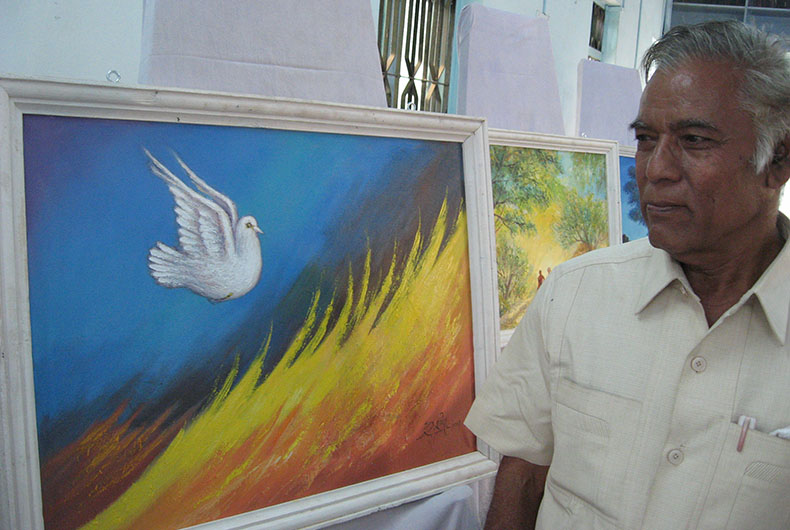
In 1970, Rasheed Artist permanently moved to Mumbai,and started working on banners, sketches and art works for the upcoming films at V. Shantaram’s Mumbai Central Film Department. He was earning reasonably well now. But to earn was never in his priority list. Therefore he decided to leave Mumbai and return back to Malegaon where his talent soon witnessed a surprising turnaround.
“Innovation and creativity have always been my passions. Back in Malegaon, I began working on popular couplets of Urdu poets and tried to portray them in my paintings”, he recalled.
There was no looking back after that. He soon acquired perfection in transferring Urdi couplets over the canvas with amazing interpretational skills. Hundreds of canvas paintings portraying Urdu couplets by the poets like Mirza Ghalib, Firaq Gorakhpuri, Meer Taqi Meer, Majrooh Sultanpuri, Rahat Indori, Shabina Adeeb, Parvin Shakir and others were ready in quick succession. Subsequently, it became customary for the Malegaonians to gift Rasheed Artist’s paintings to the dignitaries who would visit the town.
While the one gifted to veteran musician Naushad painted on the famous couplet Aabadiyon main dasht ka manzar bhi ayega; Guzroge shaher se to mera ghar bhi ayega is still greeting the visitors in his hall, Shabana Azmi has put the one presented to her father Kaifi Azmi portrayed on Aik woh keh jinko fikre nashaib o faraz hai; Aik hum keh chal pade toh behr haal chal pade in her office.
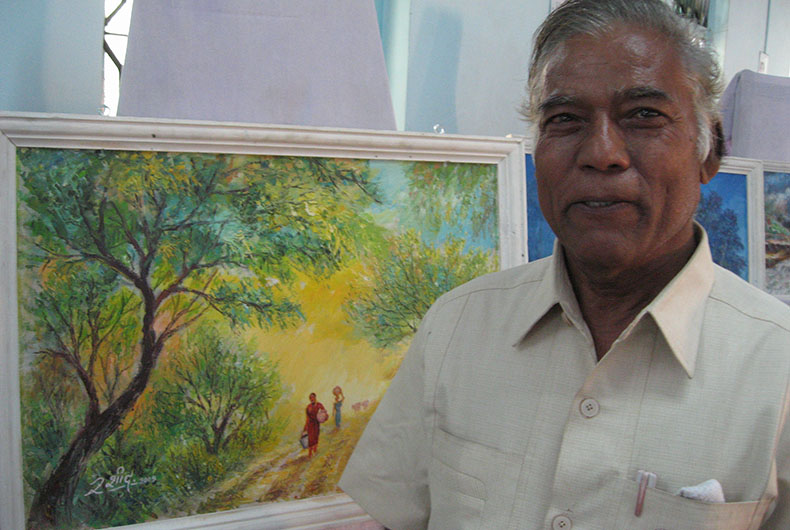
Majrooh Sulatnpuri was lucky to get two paintings. Of these two, the one on Sutoone daar pe rakhte chalo saron ke charaag; Jahan talak yeh sitam ki siyah raat chale is in Canada and the other on Phir koi masloob hua sare rahe tamnna; Aawaze jaras pichle pahar taiz bahut hai is part of the splendid collection at Dubai Urdu Library.
Simultaneously, Rasheed Artist also perfectly worked on portraits of the people he loved the most. They included freedom fighters, world leaders, artists and poets. When Dilip Kumar visited Malegaon in 1980, he was thrilled to see his portrait. The portrait presented to him is now greeting the people at his Bandra residence. The portraits of Iranian leader Ayatollah Khomeini and Mirza Ghalib presented to Ferhad Parizaad of the Iranian Cultural Centre in Mumbai in 1985 are in Iran.
Today Rasheed Artist is the ultimate and globally recognized name when it comes to canvas paintings. In fact, he is perhaps the only artist in the Indian sub continent who portrays Urdu couplets over the canvas with such a sound interpretational skills. Yet Rasheed Artist has few more dreams in his life.
“Apart from writing a book on Sketching and Painting, it’s my dream to transfer the history of Urdu Ghazals from Ameer Khusroo till date over the canvas”, he said in a determined tone.
Rasheed Artist at this stage of his life is finding it easier to run the expenses of his family. However to run his dream project is of course an expensive affair. Moreover, looking at him who resolutely turned down the offers by popular art galleries in London and Australia to auction his paintings, it seems impossible for him to make any compromises merely for the sake of arranging funds needed to work on these projects. Yet one thing is certain. The stubborn in him would not let him sit idle. It would be really interesting to see how he achieves these targets.
[An abridged version of this article was published by The Times of India, on August 25, 2010 in its Nashik edition.]
source: http://www.ummid.com / Ummid.com / Home> India> Life & Style / by Aleem Faizee, ummid.com / June 13th, 2009
